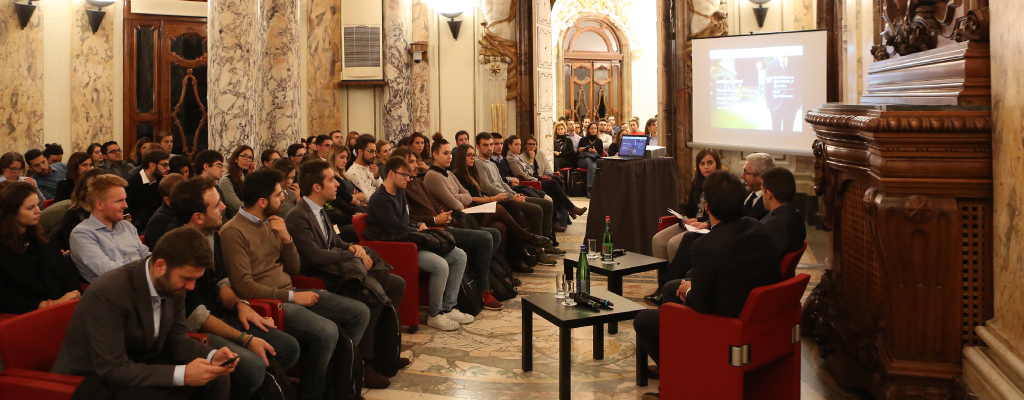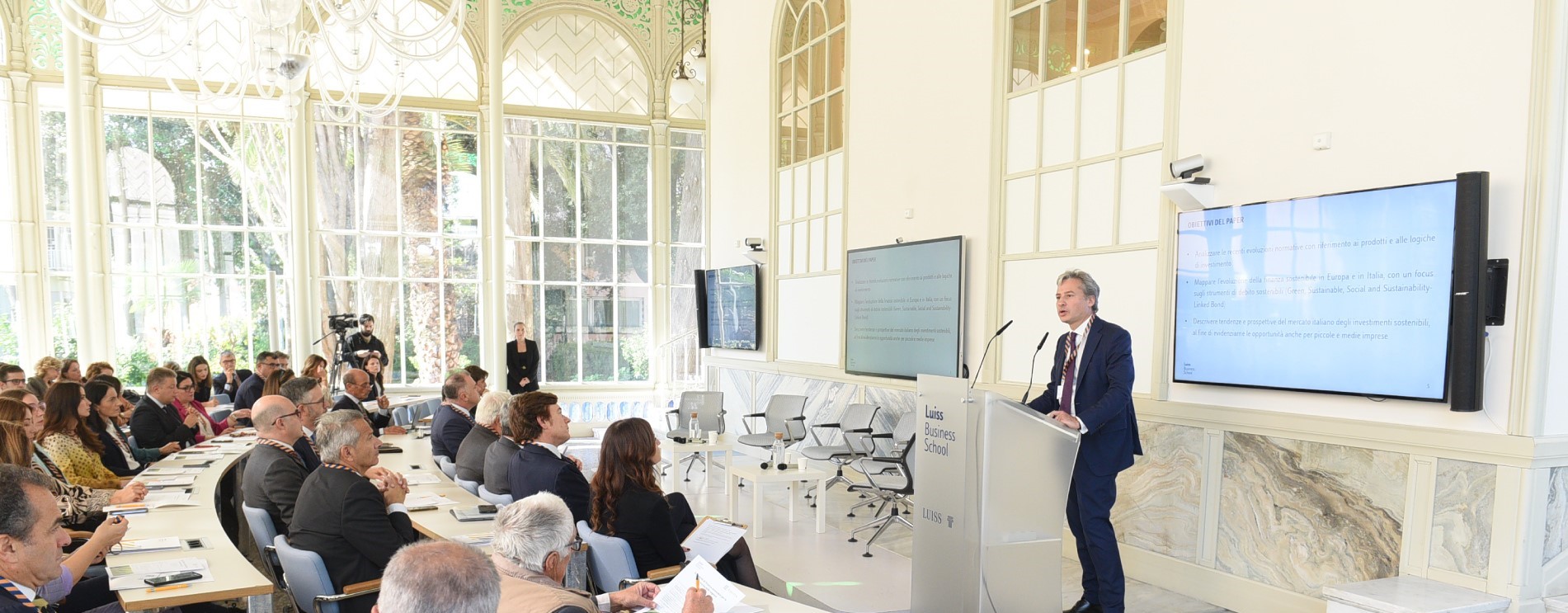
On November 8 2016, LUISS Business School hosted Walter Ruffinoni, CEO at NTT DATA Italy, for the «#L4T – Leader for Talent» event reserved for the Students of Specialized Masters. Here are the insights written by Katrina Ustyuzhanina, student of the Master in Tourism Management who attended the event.
Leader for Talent is a great opportunity for LUISS Business School students to meet the most successful professionals from the corporate world. During an hour of listening to the Leader’s speech, students can enrich themselves with the most useful operational methodology information used in the World’s leading companies and get precious advices for their career paths. This time students had a chance to meet an outstanding professional – Walter Ruffinoni.
Walter Ruffinoni is a CEO at NTT DATA Italy. He joined the company in 2010, bringing to the role more than 20 years of experience in the Technology and Consulting Industry along with an Executive Management Leadership. His main mission as a CEO is to make NTT DATA Italy the leading company in digital innovation and in particular cybersecurity, undoubtly he has been extremely successful in brining this mission into action.
 Mr. Walter Ruffinoni shared with the students his vision of the leader in the future and gave some suggestions about building a successful career plan according to his personal professional experience. Mr.Walter Ruffinoni mentioned that we are living in the time of digital revolution, where the changes are happening with an unusual speed and are transforming not only the way we interact with each other, but also the business society. Our generation will be facing the biggest opportunities in the business world, but in order to find your place in it you will have to be educated and to be an advanced user of new technologies. Every step forward that technology is making is also creating an exponential disruption , however it means that there are no more boundaries that were preventing people in the past to make their dreams come true, today you have a chance to become a corporate citizen , to be a start uper,enterpreneur or to have any career you wish. There are 10 basic rules that Mr. Ruffinoni suggested the students to follow when they will start their career path:
Mr. Walter Ruffinoni shared with the students his vision of the leader in the future and gave some suggestions about building a successful career plan according to his personal professional experience. Mr.Walter Ruffinoni mentioned that we are living in the time of digital revolution, where the changes are happening with an unusual speed and are transforming not only the way we interact with each other, but also the business society. Our generation will be facing the biggest opportunities in the business world, but in order to find your place in it you will have to be educated and to be an advanced user of new technologies. Every step forward that technology is making is also creating an exponential disruption , however it means that there are no more boundaries that were preventing people in the past to make their dreams come true, today you have a chance to become a corporate citizen , to be a start uper,enterpreneur or to have any career you wish. There are 10 basic rules that Mr. Ruffinoni suggested the students to follow when they will start their career path:
First rule is to choose the right company to work for. In order to do that you have to understand the vision a company has, the values it is endorsing, along with the culture and the people that are envolved in it. The company you will choose has to be a right fit for your personal characteristics, because at the end of the day you invest so much of your personal time in it, that it will really make an incredible difference if you are sharing the vision and feel the purpose of making all the effort.
Second rule is to periodically check your own progress. Take a couple of hours to ask yourself ”Am I learning? Am I acquiring new skills that are taking me to the goal I would like to pursue?”. Make sure if the answer to these questions is ”No”, you have to do something about it.
Third rule is to always ask feedback from the people youwork with, from your boss and your leader. It will help you to distinguish your strengths and your weaknesses. Certainly your weaknesses are something you have to work on , but do not forget to know your strengths, you have to build on those, because they are going to be an accelerator to your career.
Fourth rule is to never stay in your comfort zone. You have to always push yourself beyond your limits. Once you feel confident and comfortable in what you are doing in your work – it is time to move on. It has to become your philosophy and the rythm of your internal clock.
Fifth rule is to put passion in everything you do. Passion is an amazing engine that potentially can make anything possible. Try your best not to be shy but to use the maximum of your energy and passion in the job you do.
Sixth rule is to not be afraid of making mistakes. Never be afraid of failing, because by trying you will either win or you will learn. It is important to put all of your effort in a task rather than doing nothing, even if you are not sure whether you will succeed.
Seventh rule is to not put a lot of attention on your salary or earnings at the beginning of your career. In the first 5-6 years your goal is to lay the grounds and build the leader you want to become, therefore your salary or earnings in this period of time will not be a critical factor. However, in order to do that you need to pick a job that you like, where you can learn a lot of things, improve your skills and put yourself out of a comfort zone.
Eighth rule will apply when you will become a leader. Remember that a Leader is different from a Boss,a leader is generous, welcoming, suggesting and proposing. You will have to set a vision, that is inclusive and sustainable, because you have to give a purpose for the people working with you, for you and around you. Your strategy has to take the right focus, to be simple and understandable for everyone.
Nineth rule is to be a brave leader and to always be yourself. If somebody is putting you in a particular place, there must a reason why it is you and not another person. Some people tend to change their personal characteristics depending on the position they were given in a company, never do this kind of mistake – always stay true to yourself.
Tenth rule is to always think of talking to the people’s mind and heart, emotions play an incredibly important role in being a leader. Apply story telling every time you can and listen to the people. Communication is the key, it makes people feel a part of the big picture which will definitely stimulate their perfomance.
Mr.Walter Ruffinoni is an expert in technology and executive management field, LUISS students could not miss an opportunity to ask him questions, Mr. Walter Ruffinoni gave full answers to all of them. Here are the list of Questions and Answers:
- How did a small start-up in Calabria, one of the Italian regions most affected from the digital gap, succeedin becoming a center of excellence in Cyber Security Research?
- There are three main ingredients for that. First a purpose, going back to the 2000, it was 3 people’s dream to build a working positing and an opportunity to hire employees, which will prevent people from leaving Calabria, because there is no work. Second is passion, by becoming a visible leader in technology we are able to attract many young people to work with artificial intelligence, cyber security and so on. Third is the innovation ecosystem, we started collaborating with a local university, which is preparing trained specialists with the skills we are looking for. We also think about Cosenza employees’ future, if one day our operation there will stop, they will have a good technology experience and will be able to find a job anywhere else. Currently we have grown from 50 people to 200 people within 3 years. Now we are coming to do the same in Naples.
- Which are the actual risks led by the digital revolution in terms of cyber security? Which viable solutions do you see in a long term perspective and in particular which strategy is NTT pursuing?
- Cyber security is very complex, investing in a cyber security seems strange, because if everything is going well you will be wondering why are we investing in it, but once it goes wrong it can be very dangerous. The more digital world is developing, the more data is growing and today data gives organizations a competitive advantage. These days the companies have to protect a complex environment. My vision is that the cyber opportunity will be perceived as a threat in doing business in a future world; you need to protect an amazing number of elements that are going to become a potential source of attack for your company. However, there is another way to go, our strategy is to put cyber security in the 1st place, our company was even thinking to reframe its identity to a security company. There is a lot of awareness that needs to be carried out in the society, corporations, institutions and the private life. We need to educate our children to the right use of a social media, data and how to have more privacy sharing.
- The Europe Code Week has just ended. What do you think about coding courses introduction into fancy school programs? How teaching paradigms are evolving with the digital revolution? There will be an empowerment of next generation learning capacity or we risk digital dementia to gain the upper hand?
- We strongly believe that we need to get more people exposed to technology, especially women. It is not easy to find a presence of women in STEM universities. We have a day dedicated to kids, which is called ”kids in the company”. We try to let them start coding from scratch, for children it serves as a game instrument, but it gives them a basic understanding. Our purpose is to make sure that every year more boys and girls attend this course. One thing we are lacking is people coming out from the technology faculties. In our case we try to fill the gap.
- Do you think the company with Japanese origin and its peculiar mindset has had an influence on the corporate pursued strategies?
- In my career I was working for a company acquired by USA, it had a ”straight to the point”. We had to plan the budget for this quarter and to always increase the bar, we worked as if there was no next quarter rather than this one, and it was kind of a ”hire or fire” strategy. If the change in numbers was not as it was written in the plan, for the first time you were safe, next time you were out. On the opposite, Japanese culture is very different. In Japanese company they asked me to do a long-term plan. The first and second year while we reaching the planned number in our budget I didn’t get the request to raise the bar. There is more attention to sustainability, it is not about making the numbers bigger, but creating the grounds to keep achieving the same numbers and get the company to grow. We are an Italian company owned by a Japanese company. From our starting point they gave us enough time to transform the company and to build the right grounds.
- Which is the role played by women in the digital revolution and the more effective ways to attract female talents?
- I strongly believe that women have a great opportunity in a digital world. We are taking this topic seriously in our company, we set up a target of having 50% of hiring women employees, 50% of the management promotions need to be women too, probably the target won’t be achieved within 2 years, but it is important to keep working on it and to make structural changes in a company. We have to give the same opportunities to women in the technology world.
- Which do you think are the pros and cons of public services digitization? Which is the likelihood of human jobs being cut ?
- The technology revolution will not stop, we either have to embrace it and try to get the best out of it or we will lose. For sure a lot of jobs will change, if you go to the cities like Tokyo and Shanghai you can see more and more robots alongside citizens. There are already machines diagnosing cancer, artificial intelligence lawyers and artificial intelligence journalists in USA. Digitalization will hit the banking sector in Italy, today there is no need to go to the banks like we did 10-15 years ago, we can do it online, a lot of branches will be closing, there will be a real estate revolution and a lot of people will be relocated. The digital revolution is here; in 10 years almost a half of current jobs will not exist anymore and there will be new jobs which will require a new set of skills. We need lead the revolution and seize the opportunities coming from it.
- Taking into account the Genesys voice platform implemented for Fastweb and the central role played by customer satisfaction, could you tell us its relevance in the whole global NTT strategy and which actions have been undertaken?
- Customer satisfaction is the most important aspect of every single company. Look at any emerging companies like Amazon, Airbnb, Uber etc. if there is one thing impressing me is the user experience. In the future companies will have to make sure they can satisfy customers; if the company does not have the right customer experience it will be a matter of few years till they close down their business.
- Which resources and distinctive capabilities should a company hold to gain a sustainable competitive advantage in the IT service and solution field?
- Picking the right technology and the right trend, for us it is absolutely the key. Of course you need to have the right people around you, you need people who are willing to experience new things and to bring passion to the company. It is also very important to have the right focus on innovation.
- How is the European market of digital technologies similar or different from an Asian market?
- One of the main differences is of course the data using. Another incredible thing is that the quality focus is different. The western mentality is to do good enough, but for the Japanese the quality is a number one issue. Finally, the dedication and the sense of belonging. When I was working in the American Cyber company I asked my colleagues for how long they’ve been working in the company and I got the answers ”3, 2, 4, 5 years”. When I entered the NTT Data, the first time I asked few people the same question and after the fifth person told me ”since university” – I stopped asking. In Japan the company you choose to work for is for life. The sense of belonging, the way you are treated by the company is totally different. As Italians we should take Italian creativity and flexibility and combine it with Japanese dedication, long-term execution and teamwork, then you will get the most you can possibly imagine.
It is worth mentioning that it is interesting to realize how simple and genuine a successful and great people are. How easily they share there own experience and give you a life changing advices . These were 2 fantastic hours where all the LUISS students who attended this meeting learnt a lot of useful information and certainly are going to apply it in real life. Our main goal is not only to become a leader, but to create leaders around us and be the change we want to see in this world.
(Article by Katrina Ustyuzhanina, student of the Master in Tourism Management)
Gallery
16/11/2016













